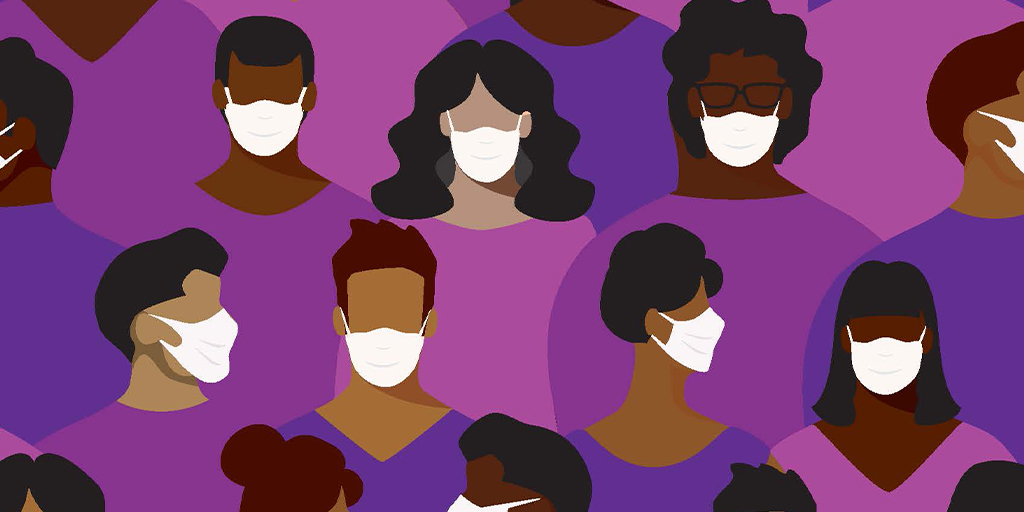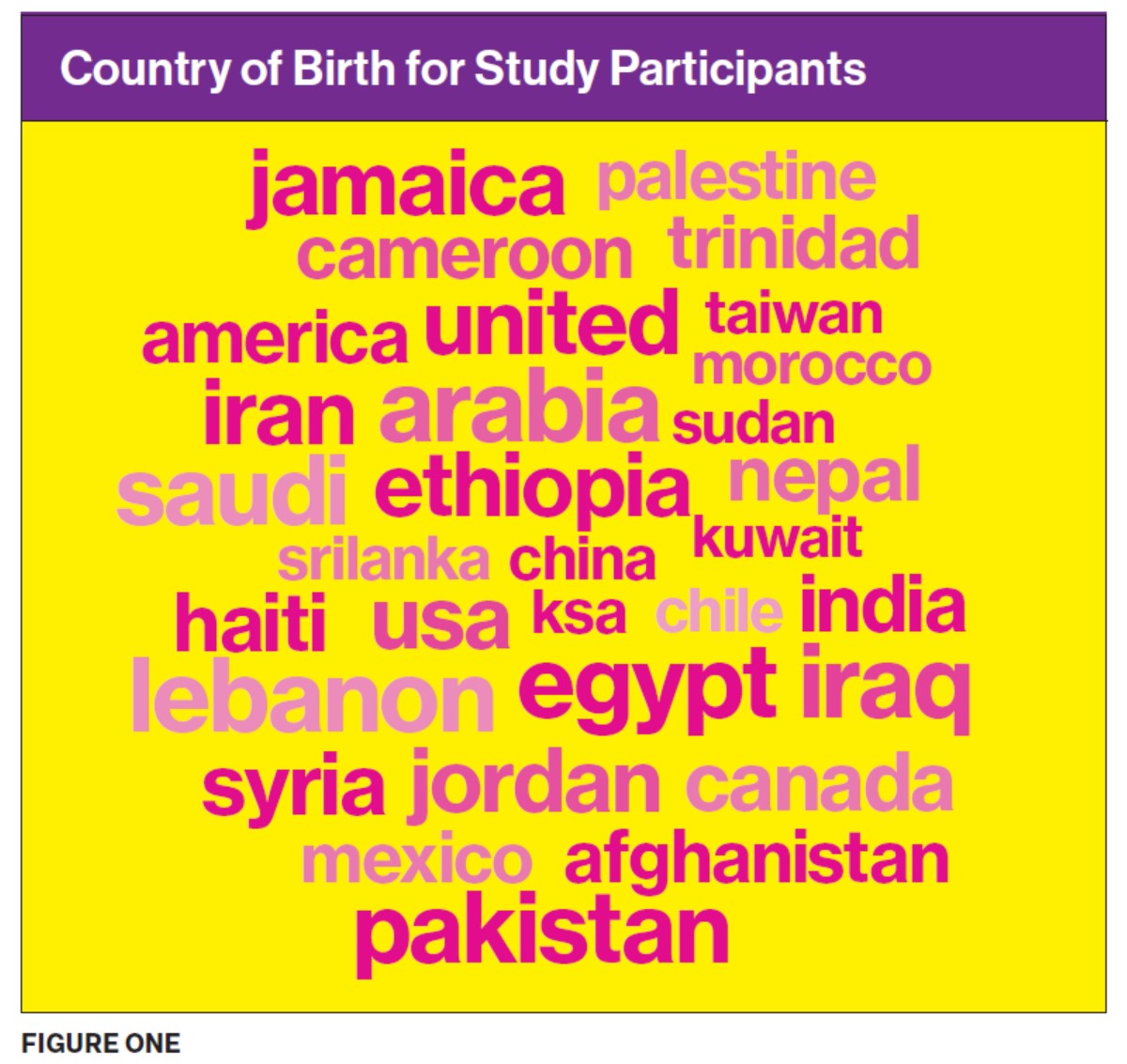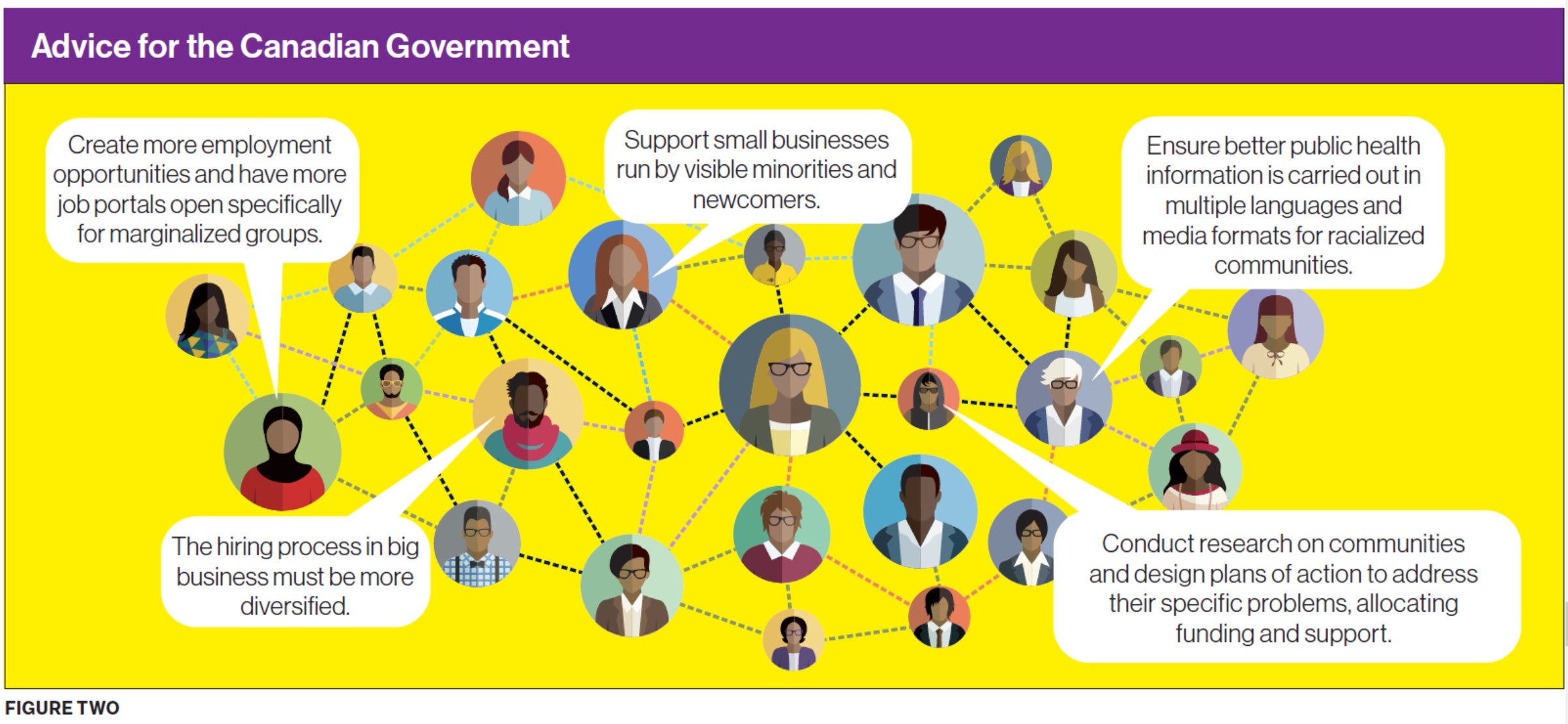
As we collectively work to create a more inclusive Canada, academics, community leaders and organizations are increasingly partnering to leverage data in ways that advocate for targeted support to mitigate the challenges that have arisen during the global pandemic. Without these efforts, Canada risks having an uneven recovery that puts racialized Canadians in a worse situation than before the pandemic.
Seeking to contribute to this effort, the Canadian Arab Institute (CAI) recently collaborated with Brock University on a research study examining gaps in knowledge about the lived experiences of racialized communities. Together with myself and Brock President Dr. Gervan Fearon, the CAI oversaw a study designed to cultivate dialogue across several groups of racialized Canadians.
Our study evaluated the impact of COVID-19 on Arab, Black, Hispanic, Indigenous, South Asian and other racialized groups across Canada. The aim was to identify and articulate the challenges they have faced and continue to face, with the mission of informing government policy, program development and civil society interventions. In this article I will summarize our findings.
Our Research
We set out to examine the impact of COVID-19 on racialized groups across Canada along five dimensions of well-being: physical, financial, emotional, spiritual and social. Taken together, these elements form ‘the social determinants of health’. Our study consisted of two elements: a structured questionnaire and individual interviews. A total of 215 participants completed the survey and 66 were interviewed. Field work was completed over the four-month period between September and December of 2020. Data were collected on a wide range of characteristics that have been found to be important drivers of pandemic impact. These factors include:
RACE. Arabs represented 34 per cent of our sample, followed by 17 per cent South Asian and 14 per cent Black individuals, 10 per cent biracial, and nine per cent Caucasian. East Asian, South-East Asian and Latin American subjects each represented less than five per cent of the sample. Other racialized groups included in the sample were West Asian, Indigenous and Jewish respondents.
GENDER. Respondents who self-identified as female constituted 66 per cent of all respondents. Two per cent of respondents described themselves as ‘gender non-binary’.
AGE. People between the ages of 25 and 34 years represented the largest cohort in the sample at 39 per cent. Those between the ages of 35 and 54 represented 27.9 per cent, and 24.2 per cent were 24 years and younger.
EMPLOYMENT STATUS. The vast majority of respondents (66%) were employed outside of the home, with almost half (46%) engaged in full-time employment. The percentage of unemployed individuals was 11.2 per cent. Interestingly, Arab respondents registered a lower percentage of unemployment: 4.8 per cent.
INCOME. Almost 10.7 per cent of respondents earn less than $20,000 annually while about one third reported incomes in excess of $90,000.

For individuals who were receiving mental health support prior
to the pandemic, the crisis only exacerbated their illness.
What People Told Us
Survey participants were asked to indicate whether they trusted the response measures of the municipal, provincial and federal governments. Whereas we found notable differentiation in respondents’ sense of trust around the provincial response to COVID-19, there was a higher level of trust for the Federal Government’s response across all respondents.
Interestingly, Arab respondents displayed a stronger sense of trust compared to non-Arabs. In terms of overall ranking, respondents had the highest levels of trust in the municipal and federal response measures (over 62 per cent of Non-Arabs and over 73 per cent of Arabs ‘strongly agreed’ or ‘agreed’ with them), compared to provincial response measures, where 54 per cent of Non-Arabs and 61 per cent of Arabs ‘strongly agreed’ or ‘agreed’.
Both Non-Arab and Arab respondents indicated an improvement in their perception of leadership at the federal level: 56 per cent of Non-Arabs and 60 per cent of Arabs noted an improved view of the leadership of Prime Minister Justin Trudeau in terms of his handling of the pandemic. The provincial perception of leadership followed with 54 per cent of Non-Arabs and 59 per cent of Arabs declaring an increase in their perception of their Premier’s leadership during the pandemic. Lastly, 35 per cent of Non-Arabs and 43 per cent of Arabs indicated an increase in their perception of leadership of their local mayor.
While a collective sense of trust was evident, our subjects made it clear that they had become tired of the daily updates from all of these leaders, which they told us focused too heavily on case numbers.
As indicated, participants were asked to respond to questions about the impact of COVID-19 across five dimensions of well-being. Following are highlights of our findings.
PHYSICAL WELL-BEING. Physical well-being refers to one’s ability to maintain a healthy quality of life and carry out daily activities without fatigue or physical stress. During the pandemic, this category grew to include maintaining one’s health by avoiding infection. Fewer Arab respondents (32%) compared to Non-Arab respondents (40%) considered themselves at risk of becoming infected with coronavirus. At the same time, a larger percentage of Arab respondents (29%) were unsure of their risk compared to Non-Arab respondents (23%).
A similar percentage of Arab and Non-Arab respondents identified as having had coronavirus-like symptoms (36 and 35 per cent, respectively). The respondents who answered positively to one or more of the listed symptoms were also asked about the actions taken in response to the symptoms they were experiencing. Almost four times more Arab respondents identified as performing a COVID-19 test in response to their symptoms: 13% per cent of Arab respondents listed a COVID-19 test as a response to symptoms, compared to only three per cent among Non-Arab respondents.
FINANCIAL WELL-BEING. Financial well-being refers to the process of managing resources to maintain operations within a household. This involves making informed financial decisions, including setting realistic goals and preparing for both long-term needs and short-term emergencies. Financial well-being is significantly affected by one’s ability to find a well-paid job, which is particularly difficult in higher-cost urban locations, such as the Greater Toronto Area (GTA).
One third of Non-Arab respondents and one quarter of Arab respondents said they had experienced reduced hours or job loss as a result of the pandemic. However, the financial impact went well beyond this aspect: More than half of Non-Arab respondents (52%) said they had been financially affected by COVID-19 and a high percentage of Arab respondents (45%) also felt an impact to their financial situation.
When it came to mitigating this financial impact, a larger percentage of Non-Arab respondents requested payment deferrals from banks or service companies (20%) compared to the Arab category of respondents (14%). One third of Non-Arab respondents had accessed at least one of the government’s financial relief programs designed to help individuals and businesses mitigate the impact of the crisis, compared to less than 29 per cent among Arab respondents.
While many of the people we interviewed transitioned to working from home, family businesses and parents who were entrepreneurs experienced more financial challenges. Students acknowledged some financial assistance, including government student benefits and scholarships. Government financial support, particularly the Canada Emergency Response Benefit (CERB), was used by many interviewees: One third of Non-Arab respondents accessed at least one of the financial relief programs compared to less than 29 per cent among Arab respondents.
SPIRITUAL WELL-BEING. This category of well-being encompasses faith and hope, and often involves participation in organized religion, which is a major part of community-building for Canadians and newcomers alike. Given their community’s propensity to maintain strict religious practices, it is not surprising that a higher percentage of Arab respondents reported no interruptions to their spiritual practices — even though places of worship were closed. Interestingly, the level of importance attached to spiritual practice was equal for both Arabs and Non-Arabs: An equal percentage of both groups (68%) indicated religious institutions are either ‘very important’ or ‘somewhat important’ to them in providing support.
When asked about the level of engagement with spiritual practices during the pandemic, a higher percentage of Arab respondents (63%) reported ‘no change’ in their religious practices compared to Non-Arab respondents (56%). A larger percentage of Non-Arab respondents declared either an increase (24%) or a decrease (20%) in spiritual practices compared to Arab respondents (19 per cent reported an increase and 18 per cent noted a decrease).
We believe a lesser change in the religious practices of Arab respondents may be linked to less of them belonging to a congregation: Only 36 per cent of Arab respondents consider themselves as being part of a religious or spiritual congregation, compared to 40 per cent of Non-Arab respondents. Therefore, a reduction in congregational activities was less likely to affect Arab respondents.
EMOTIONAL WELL-BEING. This factor refers to the awareness and expression of feelings, including happiness, sadness, fear, stress and anger. Well-being in this category includes the capacity to manage behaviours related to strong feelings—including the ability to cope with high levels of stress. While significant efforts have been focused on dealing with physical health in recent months, our research indicates that, moving forward, there should be an increased focus on (and access to) mental health resources, even for those who are not diagnosed with COVID-19.
The self-declared level of stress increased ‘significantly’ or ‘somewhat’ for 81 per cent of Non-Arab respondents and 77 per cent of Arab respondents. Many participants noted that being alone and isolated contributed to their stress; others suggested that the availability and frequency of information became a source of fear, negativity and anxiety. Newcomers, in particular, felt very alone, using terms like ‘confined’ and ‘imprisoned’ to describe both their physical and emotional state. Many of these individuals do not have family or close friends nearby, and were unable to engage in their workplace or academic setting remotely.
It was evident that maintaining social connections — either through socially-distanced outings outdoors or online via group chats — created a sense of connection. In fact, it appears that stronger support systems have been created as a result. Recognizing that socializing online is not the same as physical presence, many suggested they had to quickly adapt and accept these connections.
When asked if they had accessed mental health services for any reason, one quarter of Arab respondents and over one fifth of Non-Arab respondents indicated they had done so since the start of the pandemic, either virtually or in person. Several participants reported that the lack of access to medical support (due to pandemic restrictions) increased their anxiety and stress. And for those who were receiving mental health supports prior to the pandemic, the crisis only exacerbated their illness.
It is evident to us that emotional well-being and mental health — for all participants — was an issue of paramount importance during the pandemic. Whether it was a simple as going outdoors for a walk, the ability to connect with friends virtually, or access to professional services, participants were open about and cognizant of their emotional well-being and that of others, acting as supports or advocates in many cases.

SOCIAL WELL-BEING. This factor refers to the ability to connect meaningfully with other people in one’s community. It includes establishing positive relationships with friends, family, co-workers and other community members.
This category of well-being is unique in the sense that it encompasses the amount of social capital at one’s disposal. In other words, the extent of a person’s social network has a direct correlation to the resources that are accessible, contributing significantly to overall well-being. This is particularly important for individuals who are less prosperous, as social capital can connect people to opportunities and resources that cannot be gained without direct assistance.
We found that the groups surveyed tend to rely on close networks for information-sharing and support — rather than relying solely on the media. It was evident that close social networks of family and friends were of critical importance in terms of information-sharing, emotional support, and overall well-being during the pandemic. Stronger bonding within social networks, including family, was common.
Outside of their immediate household, a higher percentage of Arab respondents reported regular contact with 10 people or more (17%) compared to Non-Arab respondents (9%). In addition to seemingly larger social circles outside of their household, Arab respondents seemed to rely more on technology on a daily basis, whether it be phone calls, video chatting or social media (11%) versus Non-Arab respondents (6%). Non-Arab respondents were more inclined to use two or more technology solutions (34%) compared to their Arab counterparts (27%).
Social capital is one of the most effective forces in supporting the well-being of racialized communities. Durable, responsive social networks are incredibly important in facilitating access to key resources, including healthcare and employment. Social capital is also linked to trust relationships that are key to linking others to supports and bridging gaps that may be barriers in the broader community.
For all surveyed, close relationships were essential for support and sustenance — whether helping a local family member, or participating in a Zoom call with close friends. For younger participants, in particular, great emphasis is placed on exchanges within their social network and how losing the in-person contact affected them.
For newcomers, a lack of social networks impacted their well-being significantly. This suggests that opportunities should be created for newcomers to Canada to connect with a community and establish bonds. It may also speak to how institutions establish communication channels for support. While definitions of community differed across the study participants, the strength of bonding social capital helped people cope with emotional and mental health challenges and, perhaps, even develop stronger resilience.
The importance of stronger, direct communication — grounded in trust — was clear for connecting with and supporting racialized communities. Participants told us how important it is to acknowledge the intricacies of different communities, including preferred media, modes of communication and translations. Our work also indicated the importance of providing culturally-appropriate messaging, including proactively countering misinformation. Going forward, there is a clear opportunity for community-based organizations and local organizational leaders to engage with governments to make this a priority.
Key Takeaways and The Road Ahead
Despite the challenges presented by the pandemic, our participants visualize a clear road to recovery. They conveyed hope for socializing with friends and family, returning to work and feeling safe again. They also recognize that mask wearing and social distancing are likely to be with us for some time to come.
Participants acknowledged that it will be a slow road to recovery for many businesses, families and individuals whose struggles were heightened during the pandemic, whether through loss of employment or access to medical services. They were also eager to share their action plans to help Canadians in the future. Many referenced health initiatives, such as research for vaccines and ongoing medical supports. They suggested that financial aid and mental health services should be more inclusive and accessible, with a focus on community-based care.

Others noted a focus on youth, ensuring that children’s wellbeing and vitality is maintained, including their education. A few addressed broader strategies that would facilitate the ‘design of a social fabric that is resilient and flexible’. Following is some representative input:
• “I feel like we should take more of our tax dollars and invest them in resource-based organizations that actually take care of citizens.”
• “Continue supporting small businesses and people who have lost their job with financial aid. Stop rent payment and increasing rents for people until this pandemic is over and they have their jobs back.”
• “Job outreach and recruitment programs would be a great help to those who are looking to hire and those who need to find work.”
Many referred to specific government support to boost economic recovery, often with a specific focus on lower income individuals, access to affordable housing and guaranteed income support:
“There should be a guaranteed income plan for Canadians, with a universal minimum wage.”
“We need more grants and supports to start small businesses and for schools and employment.”
“Address student debt load and repayment.”
In closing
The expression ‘unprecedented time’ is often used to describe the COVID-19 pandemic. Indeed, we have unprecedented events during this crisis, including empty airports and skies, and closed borders and vacant offices in the heart of big cities. We have also witnessed calls to action to address racial injustice, both in Canada and across the globe.
Perhaps future generations will view this pandemic as a clear call to action — an unprecedented time that caused us to reflect, react and reset collectively. As one of our participants eloquently suggested: “It was a strange time, but weirdly it was — maybe — just what humanity needed.”
Walid Hejazi is an Associate Professor of Economic Analysis and Policy at the Rotman School of Management. He developed Canada’s first MBA course on Islamic Finance. This article has been adapted from the report, “Experiences of Racialized Communities During COVID-19: Reflections and a Way Forward,” published by The Canadian Arab Institute and Brock University. The complete report is available for download online. Lead researchers on the study included Dr. Andrea Ciologariu (Rotman MBA ‘14), Dr. Susan Murray, Rania Younes and Shireen Salti.
Share this article: